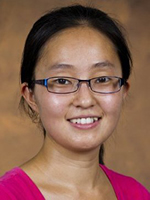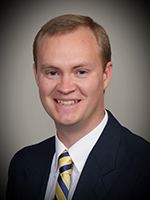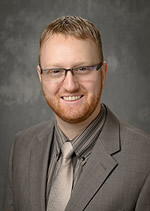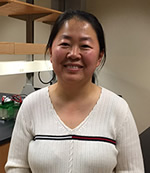Special New Faculty Welcome Issue
Welcome to these faculty members who have joined us in recent months:
 Tim Gibb, Clinical Engagement Professor, Entomology. Tim has been with the Department of Entomology since 1987 as an Extension Entomologist and was recently named a Clinical Engagement Professor. He received his bachelor's degree in zoology and a master's in entomology from Brigham Young University, and a doctorate in entomology from Kansas State University. Tim does Extension work and applied research as an insect diagnostician. He specializes in urban pest management, responding to new or current pests of homes, public buildings and landscapes. He also conducts Extension programming and public information specifically related to arthropod pests of people and animals. He serves as the department's 4-H–Youth Extension Coordinator, directing 4-H and FFA entomology programs including designing, maintaining and improving annual judging competitions and state fair exhibits. Tim Gibb, Clinical Engagement Professor, Entomology. Tim has been with the Department of Entomology since 1987 as an Extension Entomologist and was recently named a Clinical Engagement Professor. He received his bachelor's degree in zoology and a master's in entomology from Brigham Young University, and a doctorate in entomology from Kansas State University. Tim does Extension work and applied research as an insect diagnostician. He specializes in urban pest management, responding to new or current pests of homes, public buildings and landscapes. He also conducts Extension programming and public information specifically related to arthropod pests of people and animals. He serves as the department's 4-H–Youth Extension Coordinator, directing 4-H and FFA entomology programs including designing, maintaining and improving annual judging competitions and state fair exhibits.
 Wenjing Guan, Clinical Engagement Assistant Professor, Horticulture and Landscape Architecture. Wenjing comes to Purdue from North Carolina Agricultural and Technical State University, where she was a horticultural specialist working on season extension for vegetable production. Wenjing received her Ph.D. at the University of Florida. She conducted specialty melon variety evaluations under conventional and organic production systems in Florida, and investigated yield, disease resistance and fruit quality of melons grafted onto hybrid squash and African horned cucumber rootstocks. At the Southwest Purdue Agricultural Center, Wenjing will establish a research and extension program on vegetable and melon production with an emphasis on sustainable production systems. Her specific interests include season extension techniques, alternative production systems, fruit quality, plant nutrient management, and innovative cultural and pest management practices. Her longterm research goal is to increase on-farm profitability while maintaining environmental sustainability. Wenjing Guan, Clinical Engagement Assistant Professor, Horticulture and Landscape Architecture. Wenjing comes to Purdue from North Carolina Agricultural and Technical State University, where she was a horticultural specialist working on season extension for vegetable production. Wenjing received her Ph.D. at the University of Florida. She conducted specialty melon variety evaluations under conventional and organic production systems in Florida, and investigated yield, disease resistance and fruit quality of melons grafted onto hybrid squash and African horned cucumber rootstocks. At the Southwest Purdue Agricultural Center, Wenjing will establish a research and extension program on vegetable and melon production with an emphasis on sustainable production systems. Her specific interests include season extension techniques, alternative production systems, fruit quality, plant nutrient management, and innovative cultural and pest management practices. Her longterm research goal is to increase on-farm profitability while maintaining environmental sustainability.
 Brady Hardiman, Assistant Professor, Forestry and Natural Resources and Environmental and Ecological Engineering. Brady received a B.S. in Biology from Ashland University in 2003. After graduating, he spent two years as a research technician in a light microscope facility at the University of Missouri Columbia. In 2012, he earned a Ph.D. in Evolution, Ecology, and Organismal Biology from The Ohio State University. Prior to joining Purdue, he was a postdoctoral associate at Boston University working on forest community risk and resilience to climate change and the role of urban vegetation in regional carbon budgets. Brady’s research focuses on understanding the interaction of structure and function in coupled natural and human ecosystems. Specific interests include the role of vegetation in urban carbon cycling and the influence of forest canopy structure on long-term carbon sequestration rates. His research is directed toward improving management strategies for urban and rural forests to optimize provision of ecosystem services such as carbon storage and climate mitigation. Brady Hardiman, Assistant Professor, Forestry and Natural Resources and Environmental and Ecological Engineering. Brady received a B.S. in Biology from Ashland University in 2003. After graduating, he spent two years as a research technician in a light microscope facility at the University of Missouri Columbia. In 2012, he earned a Ph.D. in Evolution, Ecology, and Organismal Biology from The Ohio State University. Prior to joining Purdue, he was a postdoctoral associate at Boston University working on forest community risk and resilience to climate change and the role of urban vegetation in regional carbon budgets. Brady’s research focuses on understanding the interaction of structure and function in coupled natural and human ecosystems. Specific interests include the role of vegetation in urban carbon cycling and the influence of forest canopy structure on long-term carbon sequestration rates. His research is directed toward improving management strategies for urban and rural forests to optimize provision of ecosystem services such as carbon storage and climate mitigation.
 Jen-Yi Huang, Assistant Professor, Food Science. Jen-Yi is a food engineer by training, holding a bachelor’s degree in agricultural machinery engineering and a master’s degree in food science and technology from National Taiwan University. He received his doctorate in chemical engineering from the University of Cambridge. Jen-Yi was Research Fellow at the National University of Singapore working on nanocomposite active packaging for food and LED application in postharvest crops. His research focuses on fundamental studies in understanding mechanisms of deposit formation and removal, with particular emphasis on deposit characterization, measurements and modeling, aiming to find potential mitigation methods toward reduced fouling in food processing. He is also interested in techno-economic-environmental analysis of the impacts of fouling and cleaning on energy use and greenhouse gas emissions of food production, aiming to develop optimal management of clean-in-place process to minimize water consumption and reduce environmental impact. Jen-Yi Huang, Assistant Professor, Food Science. Jen-Yi is a food engineer by training, holding a bachelor’s degree in agricultural machinery engineering and a master’s degree in food science and technology from National Taiwan University. He received his doctorate in chemical engineering from the University of Cambridge. Jen-Yi was Research Fellow at the National University of Singapore working on nanocomposite active packaging for food and LED application in postharvest crops. His research focuses on fundamental studies in understanding mechanisms of deposit formation and removal, with particular emphasis on deposit characterization, measurements and modeling, aiming to find potential mitigation methods toward reduced fouling in food processing. He is also interested in techno-economic-environmental analysis of the impacts of fouling and cleaning on energy use and greenhouse gas emissions of food production, aiming to develop optimal management of clean-in-place process to minimize water consumption and reduce environmental impact.
 Linda Pfeiffer, Associate Professor, Youth Development and Agricultural Education. Linda earned a bachelor’s degree in psychology from the University of Wisconsin-Madison, a master’s in community counseling from Winona State University, and a Joint PhD in mass communication and environment and resources from the University of Wisconsin-Madison. Her research interests center around the communication of complex science to the public. Specifically, they include the systemic factors that affect the construction and effective translation of messages to engage the public in scientific issues. Effective messaging occurs at the intersection of message construction and the public beliefs, values, experiences, and the cultural cognitions that the audience brings to the process (rather than a simple deficit in science information). Additionally, messaging is affected by resources, institutional practices, and political processes in the public sphere. Given the recent rise in highly controversial science issues, the study of systematic factors affecting science messaging is an important and emerging area in research on science communication. Linda Pfeiffer, Associate Professor, Youth Development and Agricultural Education. Linda earned a bachelor’s degree in psychology from the University of Wisconsin-Madison, a master’s in community counseling from Winona State University, and a Joint PhD in mass communication and environment and resources from the University of Wisconsin-Madison. Her research interests center around the communication of complex science to the public. Specifically, they include the systemic factors that affect the construction and effective translation of messages to engage the public in scientific issues. Effective messaging occurs at the intersection of message construction and the public beliefs, values, experiences, and the cultural cognitions that the audience brings to the process (rather than a simple deficit in science information). Additionally, messaging is affected by resources, institutional practices, and political processes in the public sphere. Given the recent rise in highly controversial science issues, the study of systematic factors affecting science messaging is an important and emerging area in research on science communication.
 Kevin Solomon, Assistant Professor, Agricultural and Biological Engineering. Kevin earned a bachelor’s degree in Chemical Engineering & Bioengineering from McMaster University in Hamilton, ON, Canada before moving to the US to pursue both a M.S. and Ph.D. in Chemical Engineering at MIT. Prior to joining the faculty at Purdue, Kevin was a Postdoctoral Scholar at the University of California, Santa Barbara where he evaluated non-model microbes for applications in biofuel production. His multi-disciplinary research program integrates genomics research and systems/synthetic biology to develop microorganisms that sustainably produce fuels, medicines, and advanced materials. Current research interests include engineering ruminant microbiomes for antibiotic-free livestock, evaluating the metabolism of non-model microbes for the production of advanced biofuels and drugs, and developing microbes that tolerate stress for improved industrial bioprocesses. Kevin Solomon, Assistant Professor, Agricultural and Biological Engineering. Kevin earned a bachelor’s degree in Chemical Engineering & Bioengineering from McMaster University in Hamilton, ON, Canada before moving to the US to pursue both a M.S. and Ph.D. in Chemical Engineering at MIT. Prior to joining the faculty at Purdue, Kevin was a Postdoctoral Scholar at the University of California, Santa Barbara where he evaluated non-model microbes for applications in biofuel production. His multi-disciplinary research program integrates genomics research and systems/synthetic biology to develop microorganisms that sustainably produce fuels, medicines, and advanced materials. Current research interests include engineering ruminant microbiomes for antibiotic-free livestock, evaluating the metabolism of non-model microbes for the production of advanced biofuels and drugs, and developing microbes that tolerate stress for improved industrial bioprocesses.
 Nathan Thompson, Assistant Professor, Agricultural Economics. Nathan Thompson earned a bachelor’s degree in economics at the University of South Florida, a masters in agricultural economics from the University of Tennessee, and his PhD in agricultural economics from Oklahoma State University. His research and extension programs will focus primarily in the areas of production economics and farm management, with a specific emphasis on risk management as it pertains to farm-level decision making. Nathan has a strong interest in interdisciplinary, applied research with practical implications for producers and other relevant stakeholders. Some of his previous work has involved determining the economic feasibility of alternative technologies and production practices for both crop and livestock producers. Nathan Thompson, Assistant Professor, Agricultural Economics. Nathan Thompson earned a bachelor’s degree in economics at the University of South Florida, a masters in agricultural economics from the University of Tennessee, and his PhD in agricultural economics from Oklahoma State University. His research and extension programs will focus primarily in the areas of production economics and farm management, with a specific emphasis on risk management as it pertains to farm-level decision making. Nathan has a strong interest in interdisciplinary, applied research with practical implications for producers and other relevant stakeholders. Some of his previous work has involved determining the economic feasibility of alternative technologies and production practices for both crop and livestock producers.
 Josh Widhalm, Assistant Professor, Horticulture and Landscape Architecture. Josh comes from the Purdue Department of Biochemistry at Purdue, was a Life Sciences Research Foundation Fellow sponsored by the Gordon and Betty Moore Foundation. Josh earned his Ph.D. in agronomy from the University of Nebraska-Lincoln. He also received his M.S. in horticulture and B.S. in biochemistry from the University of Nebraska-Lincoln. Josh’s current research is centered around plant allelochemicals, natural products released into the environment that influence the growth and development of other species. He is particularly interested in elucidating the biosynthesis of the allelopathic naphthoquinones shikonin and juglone, and in investigating their metabolic connection with quinones involved in respiration and photosynthesis. His research on allelopathic naphthoquinones will also encompass deciphering the molecular mechanisms involved in their release into the environment, determining their biochemical modes of action, and exploring their roles in promoting (a)biotic stress resistance. The long term goal of Josh’s research program is to translate the gained basic knowledge into innovative strategies to harness plant allelochemicals for crop improvement. Josh Widhalm, Assistant Professor, Horticulture and Landscape Architecture. Josh comes from the Purdue Department of Biochemistry at Purdue, was a Life Sciences Research Foundation Fellow sponsored by the Gordon and Betty Moore Foundation. Josh earned his Ph.D. in agronomy from the University of Nebraska-Lincoln. He also received his M.S. in horticulture and B.S. in biochemistry from the University of Nebraska-Lincoln. Josh’s current research is centered around plant allelochemicals, natural products released into the environment that influence the growth and development of other species. He is particularly interested in elucidating the biosynthesis of the allelopathic naphthoquinones shikonin and juglone, and in investigating their metabolic connection with quinones involved in respiration and photosynthesis. His research on allelopathic naphthoquinones will also encompass deciphering the molecular mechanisms involved in their release into the environment, determining their biochemical modes of action, and exploring their roles in promoting (a)biotic stress resistance. The long term goal of Josh’s research program is to translate the gained basic knowledge into innovative strategies to harness plant allelochemicals for crop improvement.
 Chunhua Zhang, Assistant Professor, Botany and Plant Pathology. Chunhua earned bachelor’s and master's degrees in crop science from China Agricultural University in Beijing, China and her doctorate degree in plant biology from Purdue. She spent two years as a postdoctoral researcher in the Purdue Department of Agronomy after her graduate study and then went to University of California at Riverside (UCR) for four years of postdoctoral training. During her postdoctoral research at UCR, Chunhua worked on chemical genomics and plant cell biology and the combination of both allowed her to tackle the complex and dynamic endomembrane trafficking process in plants. She continues her research at Purdue by developing chemical biology tools that can be used in plant cell biology research, especially in studying dynamic and endomembrane trafficking process. She also uses small molecules to perform conditional genetic screen to discover cellular components that regulate endomembrane trafficking. Due to the conservation of vesicle trafficking machinery, her research has the potential to provide tools for studying plant pathogen control and human disease management. Chunhua Zhang, Assistant Professor, Botany and Plant Pathology. Chunhua earned bachelor’s and master's degrees in crop science from China Agricultural University in Beijing, China and her doctorate degree in plant biology from Purdue. She spent two years as a postdoctoral researcher in the Purdue Department of Agronomy after her graduate study and then went to University of California at Riverside (UCR) for four years of postdoctoral training. During her postdoctoral research at UCR, Chunhua worked on chemical genomics and plant cell biology and the combination of both allowed her to tackle the complex and dynamic endomembrane trafficking process in plants. She continues her research at Purdue by developing chemical biology tools that can be used in plant cell biology research, especially in studying dynamic and endomembrane trafficking process. She also uses small molecules to perform conditional genetic screen to discover cellular components that regulate endomembrane trafficking. Due to the conservation of vesicle trafficking machinery, her research has the potential to provide tools for studying plant pathogen control and human disease management.
|